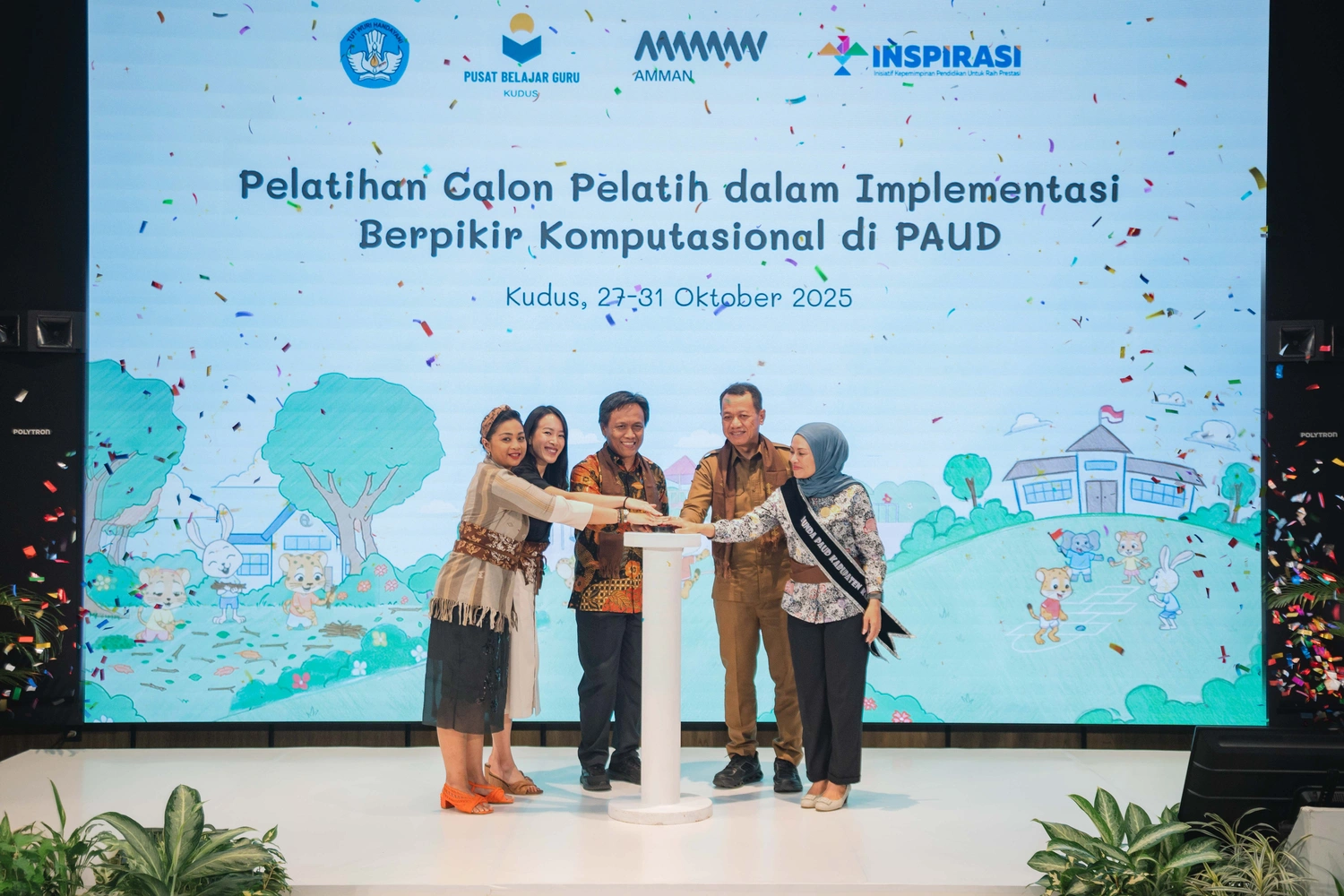Prepare Coding and AI Foundations Early, Computational Thinking Training Available for Early Childhood Education Instructor Candidates Across Indonesia
27 Oktober 2025
Dozens of prospective early childhood education (ECE) trainers from 15 provinces in Indonesia gathered in Kudus, Central Java, to participate in the "Training for Prospective Trainers in the Implementation of Computational Thinking in ECE" program, which runs from Monday (October 27th) to Friday (October 31st). They will delve into the concept of computational thinking and its implementation, which aligns with the strategic steps of the Ministry of Basic and Secondary Education in promoting Coding and Artificial Intelligence Learning (KKA).
"Coding and artificial intelligence learning is not just a trend, but a fundamental need in preparing the younger generation to face future challenges. The role of early childhood education teachers is very strategic for instilling the foundations of computational thinking from an early age – the ability to think logically, systematically, and creatively, which is the basis for solving complex problems in various fields. Therefore, capacity building for teachers in the implementation of computational thinking is our priority program," said Suparto, S.Ag, M.Ed, Ph.D, Director of Early Childhood Education (PAUD) and Non-Formal Education (PNF), Ministry of Basic and Secondary Education of the Republic of Indonesia.
This was stated by Suparto after the opening ceremony of the "Training for Prospective Trainers in the Implementation of Computational Thinking in PAUD" which took place in Kudus on Monday, October 27, 2025. This training involves 8 early childhood education teachers from Kudus Regency and West Sumbawa Regency, as these two regions have been consistently developing and implementing computational thinking at the early childhood level for some time.
During the process of developing the training guide and materials, the eight teachers were mentored by the Head of the Early Childhood Education Working Group of the National Accreditation Body for Early Childhood Education, Primary and Secondary Education (BAN PDM), Dr. Irma Yuliantina, M.Pd, and the materials were reviewed by the Bebras Indonesia Team, an international initiative that promotes computational thinking skills from an early age. The resulting training guides and materials will also serve as a reference for the development and dissemination of computational thinking training at the early childhood education level in subsequent stages, both regionally and nationally.
Since 2023, over 700 principals and teachers from 211 early childhood education units have integrated computational thinking into their daily lessons, with support from the Kudus District Education, Youth, and Sports Office (Disdikpora) and the Kudus Teacher Learning Center (PBG), which is supported by
Djarum Foundation Educational Service. Meanwhile, in West Sumbawa Regency, the computational thinking approach has been implemented by 135 teachers and school principals from 29 early childhood education units, facilitated by PT Amman Mineral Nusa Tenggara (AMMAN) since 2023.
At the same time, Kudus Regent Dr. Ars. Sam'ani Intakoris, S.T., M.T. appreciated this training program initiative for trainers held in Kudus and hoped it could benefit other regions in Indonesia more widely.
"Hopefully, with this training, teachers in West Sumbawa Regency can collaborate with teachers from Kudus Regency, so that this training becomes a provision for early childhood teachers from other regions to teach children how to apply computational thinking." This collaboration is excellent between the Ministry of Education, Culture, Research, and Technology of the Republic of Indonesia, the Kudus Teacher Learning Center facilitated by the Djarum Foundation, Amman Mineral, and the Inspirasi Foundation.
"Hopefully, this can become a sustainable program," said Sam'ani Intakoris. "We hope that this training can help correct the misconception that Computational Thinking is a new curriculum or activity, but rather a structured thinking process built thru everyday activities, as simple as the habit of washing hands or playing jump rope." What sets them apart is the way teachers provide examples and guiding questions to build children's thinking skills within an activity. Experience from Kudus and West Sumbawa shows that computational thinking, when applied consistently, will enhance children's cognitive, socio-emotional, and physical motor skills," explained Felicia Hanitio, Deputy Program Director of the Djarum Foundation's Bakti Pendidikan.
Separately, Priyo Pramono, Vise President of Social Impact at PT Amman Mineral Nusa Tenggara, added, "Computational thinking is an important foundation for shaping a generation with an adaptive mindset. The greater the potential, the earlier it is instilled. "By collaborating with educators and stakeholders from various provinces, we hope this step can accelerate the development of human resources ready to compete toward Golden Indonesia 2045," Priyo added.
The Candidate Trainer Training was attended by 38 participants, including early childhood education teachers, school principals from 15 provinces in Indonesia – from Kalimantan and Sumatra to Sulawesi, Nusa Tenggara, and Java – as well as representatives from the Directorate of Early Childhood Education and Non-Formal Education Teachers, the Directorate of Early Childhood Education and the UPT of the General Directorate of Teachers and Education Personnel.
The Prospective Trainer Training was attended by 38 participants, including early childhood education teachers and school principals from 15 provinces across Indonesia – from Kalimantan and Sumatra to Sulawesi, Nusa Tenggara, and Java – as well as representatives from the Directorate of Early Childhood Education and Non-Formal Education Teachers, the Directorate of Early Childhood Education, and the UPT Ditjen GTK and PG from Central Java and NTB provinces. During the training, participants will learn the concepts of computational thinking and how to integrate them into the national early childhood education curriculum thru an approach
In-depth learning. The training also includes hands-on practice and visits to 4 model early childhood education units in Kudus that have implemented computational thinking.
Thru this series of activities, the participating teachers are expected to become trainers who will disseminate information to more teachers in their respective regions.

